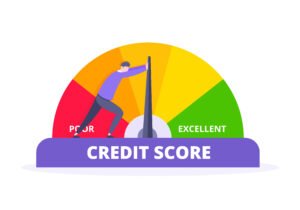
What’s a Good Credit Score for First-Time Homebuyers in North Carolina?
Your Credit Score is crucial in determining your eligibility for various loans.
Buying your first home in North Carolina? Your credit score will influence nearly everything about your mortgage—eligibility, interest rate, mortgage insurance costs, and even what you’ll pay for homeowners’ insurance. The good news is that North Carolinians start from a relatively strong position. As of 2025, the average FICO score in North Carolina is 709, right in the “good” range and unchanged from last year.
A good Credit Score can significantly impact your mortgage rates.
Why credit score matters more than most first-timers realize
Lenders use your three-digit score (typically 300–850) as a quick risk gauge and to set pricing tiers. Moving up even one tier can meaningfully lower your monthly payment and total interest paid over the life of the loan. While there’s no single “magic” number that guarantees approval, here’s how typical thresholds map to real-world outcomes for purchase loans in North Carolina:
Understanding your Credit Score can help you make informed financial decisions.
-
580–619: Approval is possible with government-backed programs (FHA/USDA/VA), but expect tighter underwriting and higher costs. FHA allows 580 with 3.5% down (and 500 with 10% down), per federal guidelines.
-
620–639: Opens the door to many Conventional loans and most VA lenders’ minimums (commonly 620). Pricing isn’t best-in-market yet, but options expand.
-
640–679: A pivotal tier in NC. Many USDA lenders and state programs reference 640 as a key benchmark; scores below it often require a deeper credit review.
-
680–739: Strong, competitive pricing and broader product menus; most first-time buyers in this band can compare multiple attractive offers.
Most first-time buyers should aim for a Credit Score of at least 680 to access better deals.
-
740+: “Excellent” territory that typically unlocks the best available rates and mortgage insurance pricing.
Your Credit Score affects not just mortgage rates but insurance costs as well.
North Carolina-specific programs and what they expect
Beyond national loan types, North Carolina offers programs that can pair down-payment assistance with competitive rates—great for first-time buyers whose scores are on the cusp.
First-time buyers should be aware of how their Credit Score influences financing options.
-
NC Home Advantage Mortgage® (NCHFA): Widely used by first-time and move-up buyers; 640 is a commonly cited minimum for participating down-payment assistance options, with some property-type nuances (e.g., new manufactured homes require 660 and aren’t eligible for the conventional product).
-
USDA Section 502 (Guaranteed): Ideal for eligible rural/suburban areas across NC; lenders frequently look for 620–640 as a baseline, and USDA requires a full credit review below 640 or if there are limited scores.
-
VA Loans: No program-level minimum score set by the VA; most VA lenders use 620 as a practical floor. If you’re just under that, some lenders may still consider your file with compensating factors.
-
FHA Loans: 580 gets you in the door with 3.5% down; 500–579 requires 10% down. Remember, FHA includes mortgage insurance premiums.
Local tip for Wake, Durham, and Johnston counties
If your score is 640–679, compare an FHA quote against a Conventional loan with down-payment assistance through NCHFA. In certain price ranges, the combination of rate + assistance + mortgage insurance can favor one path over the other—don’t assume FHA is always cheaper when your score starts with a “6”.
Maintaining a strong Credit Score is vital for homebuyers in competitive markets.
The hidden cost most NC buyers miss: Insurance
Even after you close, your credit score continues to affect your homeowners’ insurance—a major line item in your monthly payment. A recent analysis highlighted that NC homeowners with low credit can pay up to about $3,000 more per year than those with stronger credit profiles. Separate statewide estimates show “poor credit” premiums averaging $4,987 more than “good credit.” That’s money you could be putting toward principal reduction or upgrades.
Insurance rates can be higher for those with a lower Credit Score.
Bottom line: Improving your score before you buy can deliver a double win—better mortgage pricing and lower insurance costs.
A higher Credit Score often leads to overall financial savings.
What score should first-time buyers aim for in North Carolina?
Understanding what Credit Score you should aim for can simplify home buying.
-
620+: Puts you in play for many conventional and VA lender overlays.
-
640+: Often the key that unlocks NC down-payment assistance options and smoother USDA approvals.
-
700+: Where rate/MI pricing noticeably improves and your lender options widen.
-
740+: Consistently among the best pricing tiers.
Buyers with a Credit Score above 740 typically enjoy the best financing options.
If you’re months away from shopping homes in Raleigh, Cary, Apex, Clayton, Garner, or Wake Forest, set a plan now to cross the next score threshold, not just to “get approved.”
How to boost your score—quick wins and 60–120-day plays
Improving your Credit Score can be a straightforward process with the right strategies.
-
Payment history first. It’s the biggest factor. If you’ve had a late payment, resume perfect on-time payments—recent positive activity helps stabilize scores faster than you think.
-
Reduce utilization below 30%—ideally 10%. If your credit card limit totals $10,000, try to report <$3,000 (and preferably <$1,000). Time your pay-downs so lower balances hit the statement closing date.
-
Target the “last 10%” blockers. A lingering $200 balance on a store card can keep utilization elevated. Small tactical payoffs can yield outsized gains.
-
Dispute errors the right way. Pull free reports (AnnualCreditReport.com) and fix inaccuracies—especially misreported late payments or duplicate collections. The VA’s buyer guide even nudges borrowers to do this early.
-
Leverage alternative data (where it helps). Some scoring models and lenders consider rent/utility reporting. Ask your lender if they can use it for your file; it won’t replace FICO for all programs, but it can add depth to a “thin” file.
-
Don’t open multiple new accounts right before underwriting. New inquiries and short-aged tradelines can shave points at the worst possible time.
Watch for factors that can negatively impact your Credit Score.
-
Ask about rapid re-scores. If you’re close to a pricing tier and just paid down balances, a lender-initiated rapid re-score (after documented payoffs) can help your new, lower balances show up faster.
A fast improvement in your Credit Score can help secure lower rates.
Loan type snapshots for NC first-timers
-
Conventional: Best long-term fit if you’re 620+, especially 680+. You’ll avoid FHA’s lifetime mortgage insurance (if you put 20% down) and can remove PMI once you reach sufficient equity.
-
FHA: Friendly to lower scores and smaller down payments (580+ for 3.5% down; 500–579 with 10% down), but you’ll carry FHA mortgage insurance.
-
USDA: No down payment for eligible areas and incomes; 640 is a key marker, and <640 triggers a full credit review. Great for buyers just outside the urban core (think parts of Johnston, Harnett, Franklin, and Granville counties).
-
VA: For eligible service members/veterans, often the most affordable path due to no program-level score minimum and typically more flexible ratios; most lenders still use ~620 as the working floor.
Frequently asked first-time buyer questions (NC edition)
Common questions often focus on how to improve your Credit Score.
“If I’m at 635, should I wait?”
If timing allows, pushing to 640 can help with USDA and state assistance options and may improve pricing. Do the math with your lender—sometimes locking now beats waiting if rates are rising.
“How much does 20–40 points matter?”
A lot. Crossing a pricing tier (e.g., 679→680 or 739→740) can drop your rate/MI enough to save thousands over the loan term.
“Does Raleigh vs. Johnston County change what score I need?”
Not directly for national programs, but property eligibility for USDA and some assistance programs does vary by location and income limits. Your credit target stays the same; your program fit might change.
Your Credit Score can vary significantly based on location and circumstances.
Key takeaways for North Carolina first-time buyers
-
By monitoring your Credit Score, you can ensure better loan options.
-
640 is a pivotal threshold in our state for USDA reviews and popular down-payment assistance options.
-
Better credit can lower not just your mortgage rate but also your homeowners’ insurance, saving thousands per year.
Final Thoughts
If you’re planning to buy your first home in Raleigh, Cary, Apex, Holly Springs, Clayton, Garner, or Wake Forest, your credit score will play a major role in shaping your options. The stronger your credit, the more doors open—lower rates, better terms, and even reduced insurance costs. At Certified Home Loans, we specialize in guiding North Carolina buyers through every step, from improving their credit profile to choosing the right loan program. Whether you’re just getting started or ready to make an offer, our local expertise ensures you’ll have the support you need to succeed in today’s housing market.
In conclusion, a strong Credit Score can enhance your home-buying experience.





